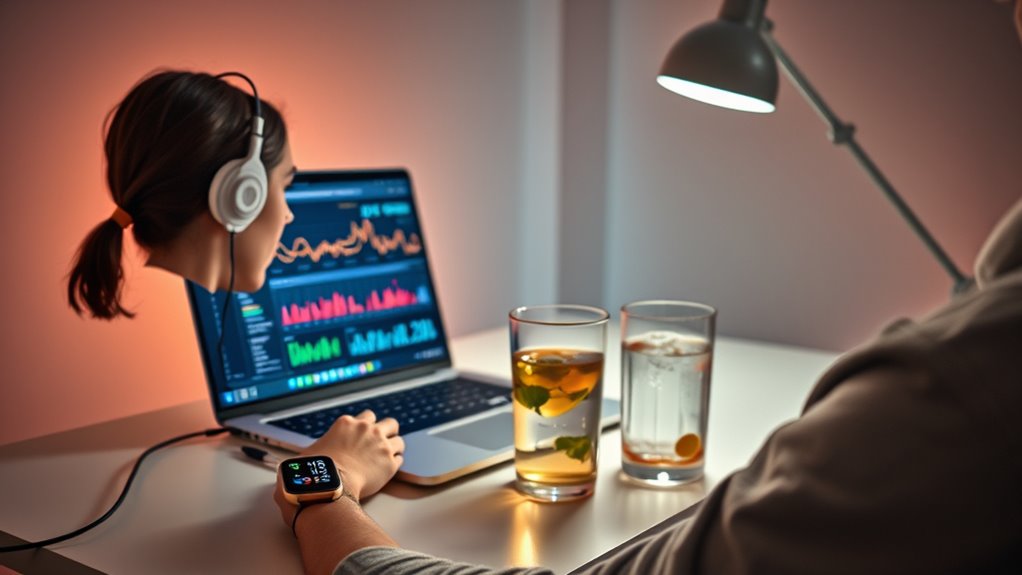Biohacking as a lifestyle combines scientific insights with personalized self-care to enhance your health, mental clarity, and resilience. By using tools like DNA testing, wearable devices, and targeted routines, you can optimize your body and mind to perform better daily. This approach encourages continuous experimentation and responsible adjustments for sustainable benefits. Keep exploring how merging science and self-care can transform your well-being in ways you’ve never imagined.
Key Takeaways
- Biohacking integrates scientific techniques into daily routines to optimize health, performance, and well-being.
- Personal genetic data guides tailored lifestyle choices for improved long-term resilience.
- Cognitive and mental resilience are enhanced through mindfulness, supplements, and stress management practices.
- Wearable devices provide real-time data, enabling precise adjustments for better health outcomes.
- Sustainable biohacking combines science and self-care for smarter living and lasting life quality improvements.

Biohacking has evolved from a niche curiosity into a mainstream lifestyle, empowering individuals to optimize their health, performance, and overall well-being. At its core, biohacking involves applying science and self-experimentation to enhance your body and mind. One of the most impactful aspects is genetic optimization, where you take steps to understand and influence your genetic makeup. By leveraging insights from DNA testing, you can identify specific genetic tendencies—like predispositions to certain health conditions or nutritional needs—and tailor your lifestyle accordingly. This might mean adjusting your diet, supplement regimen, or activity levels to better align with your genetic profile. The goal is to access your full potential by working with your biology rather than against it, leading to better long-term health and resilience.
Biohacking empowers you to optimize health and resilience through personalized science and self-experimentation.
But genetic optimization isn’t just about physical health; it also plays a vital role in building mental resilience. You face daily stressors, and your ability to adapt and recover determines your overall mental strength. Biohackers often incorporate practices like mindfulness, meditation, or nootropic supplements to boost cognitive function and emotional stability. These strategies help you develop mental resilience, enabling you to stay focused and calm under pressure. When you optimize your brain chemistry—whether through diet, sleep, or targeted supplements—you fortify your mind against fatigue and burnout. This mental clarity enhances your decision-making, emotional regulation, and overall performance, giving you an edge in both personal and professional life.
In addition, tracking your physiological responses through wearable devices allows you to gain real-time insights into how your body reacts to different biohacks. This data-driven approach guarantees you make informed adjustments, whether it’s tweaking your sleep schedule or experimenting with breathing techniques to reduce stress. Additionally, understanding reliable health monitoring methods can help ensure your biohacking efforts are safe and effective. Over time, these small, targeted interventions can lead to significant improvements in your mental resilience and overall health. The key is consistency and curiosity—by continuously learning about your body and experimenting responsibly, you become your own science lab.
Ultimately, biohacking as a lifestyle invites you to take control of your biological blueprint. Genetic optimization offers a personalized foundation, while cultivating mental resilience ensures you can navigate life’s challenges with strength and clarity. It’s about merging cutting-edge science with everyday self-care, empowering you to live smarter, more resilient, and healthier every day. As you adopt these practices, you’ll discover that optimizing your biology isn’t just a trend—it’s a sustainable way to enhance your quality of life from the inside out.
Frequently Asked Questions
What Are the Legal Considerations in Biohacking Practices?
You need to prioritize regulatory compliance and understand the legal landscape surrounding biohacking. Be aware of potential ethical dilemmas, especially with unapproved substances or invasive procedures. Research local laws before experimenting, as regulations vary widely. Staying informed and transparent helps you avoid legal issues and ethical conflicts, ensuring your biohacking practices remain safe and responsible. Always consult professionals when in doubt, and respect legal boundaries to protect yourself.
How Do You Personalize Biohacking Routines Effectively?
To personalize your biohacking routines effectively, start by tracking your individual responses to different protocols. Keep a detailed journal of how your body reacts to various supplements, diet changes, or exercise. Use this data to refine your approach, focusing on what works best for you. Remember, personalized protocols optimize results, so stay attentive to your body’s signals and adjust accordingly to create a routine tailored to your unique needs.
Can Biohacking Replace Traditional Medical Treatments?
Biohacking can’t replace traditional medical treatments because their medical efficacy is still under study, and ethical concerns remain. While you might optimize your health with biohacking, serious conditions require proven medical interventions. Relying solely on biohacking could delay essential care, risking your health. Always consult healthcare professionals before substituting or supplementing treatments, ensuring safety and effectiveness while respecting ethical standards in medicine.
What Are the Long-Term Risks of Biohacking?
Think of biohacking as walking a tightrope—you might find new strengths, but the fall could be risky. Long-term risks include unpredictable health effects, ethical implications, and psychological impacts like anxiety or obsession. You could unknowingly cause harm to your body or face moral dilemmas about altering natural processes. Stay cautious, do thorough research, and consult professionals to mitigate these risks, ensuring your journey remains a safe and mindful pursuit.
How Accessible Is Biohacking for Beginners?
Biohacking is quite accessible for beginners since you can start with simple DIY experiments like tracking sleep or diet. Community support is valuable, offering guidance and shared experiences that help you avoid mistakes. Many resources are available online, making it easier to learn safely. As you gain confidence, you can gradually explore more advanced techniques, always prioritizing safety and staying informed through trusted sources.
Conclusion
Think of biohacking as tending a personal garden. With each small adjustment—be it better sleep, mindful eating, or tech tools—you nurture your roots and help your potential blossom. Just like a garden needs consistent care and attention, your well-being thrives with intentional choices. Embrace this lifestyle as a journey of growth, knowing that every effort you make is planting seeds for a healthier, more vibrant you—your most valuable masterpiece.









